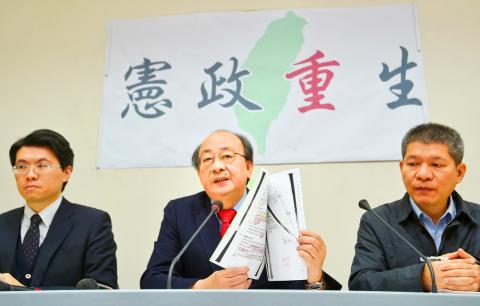Former president Ma Ying-jeou (馬英九) yesterday reaffirmed his innocence after he was charged with disclosing classified information.
“Legislators can get away with peddling their influence, but the people who uncovered the scandal have been prosecuted. Where is the justice?” Ma said. “I will definitely appear in court to fight for justice. The prosecutors did not take into account the statements I provided on the case.”
Huang had revealed details of a probe into two prominent members of the legislature, which could have erupted into a “world-class scandal,” Ma said.

Photo: Fang Pin-chao, Taipei Times
The information was relayed to former premier Jiang Yi-huah (江宜樺) and former Presidential Office deputy secretary-general Lo Chih-chiang (羅智強) because the scandal would impact the relationship between the Executive Yuan and the Legislative Yuan, which would hinder legislation proposed by the former, and because there would have been a Cabinet reshuffle after the scandal was made public, Ma said.
“I involved Jiang and Lo mainly for crisis management. In case [the scandal] broke, we [had to know] how to deal with the ensuing issues,” Ma said. “I am confident in my innocence and expect the court to make the correct decision in the spirit of justice.”
Democratic Progressive Party caucus whip Ker Chien-ming (柯建銘), one of the lawmakers involved in the probe, commended the prosecutors for showing moral courage.
“This is a long-awaited moment. This is also a constitutional moment, in which Taiwan’s constitutional governance is reborn,” Ker said. “Ma was clearly aware of the constitutional separation of powers, but he used the case for political ends. In any nation, the president would have to step down if he was found colluding with the prosecutor-general on illegal wiretaps and intervening in a [judicial] case.”
Having filed a lawsuit against Ma over the wiretapping case, the result of which is to be announced on March 28, Ker called on Ma to admit to his crimes and take responsibility to preserve his legacy.
Fromer legislative speaker Wang Jin-pyng (王金平), the other lawmaker involved in the probe, said that he had not engaged in any illegal activity and remained calm about Ma’s prosecution.
“When the incident began on Sept. 6, 2013, I dealt with it with the same calm attitude,” Wang said. “I have a clear conscience, so I remain unperturbed.”

Right-wing political scientist Laura Fernandez on Sunday won Costa Rica’s presidential election by a landslide, after promising to crack down on rising violence linked to the cocaine trade. Fernandez’s nearest rival, economist Alvaro Ramos, conceded defeat as results showed the ruling party far exceeding the threshold of 40 percent needed to avoid a runoff. With 94 percent of polling stations counted, the political heir of outgoing Costa Rican President Rodrigo Chaves had captured 48.3 percent of the vote compared with Ramos’ 33.4 percent, the Supreme Electoral Tribunal said. As soon as the first results were announced, members of Fernandez’s Sovereign People’s Party

MORE RESPONSIBILITY: Draftees would be expected to fight alongside professional soldiers, likely requiring the transformation of some training brigades into combat units The armed forces are to start incorporating new conscripts into combined arms brigades this year to enhance combat readiness, the Executive Yuan’s latest policy report said. The new policy would affect Taiwanese men entering the military for their compulsory service, which was extended to one year under reforms by then-president Tsai Ing-wen (蔡英文) in 2022. The conscripts would be trained to operate machine guns, uncrewed aerial vehicles, anti-tank guided missile launchers and Stinger air defense systems, the report said, adding that the basic training would be lengthened to eight weeks. After basic training, conscripts would be sorted into infantry battalions that would take

EMERGING FIELDS: The Chinese president said that the two countries would explore cooperation in green technology, the digital economy and artificial intelligence Chinese President Xi Jinping (習近平) yesterday called for an “equal and orderly multipolar world” in the face of “unilateral bullying,” in an apparent jab at the US. Xi was speaking during talks in Beijing with Uruguayan President Yamandu Orsi, the first South American leader to visit China since US special forces captured then-Venezuelan president Nicolas Maduro last month — an operation that Beijing condemned as a violation of sovereignty. Orsi follows a slew of leaders to have visited China seeking to boost ties with the world’s second-largest economy to hedge against US President Donald Trump’s increasingly unpredictable administration. “The international situation is fraught

GROWING AMBITIONS: The scale and tempo of the operations show that the Strait has become the core theater for China to expand its security interests, the report said Chinese military aircraft incursions around Taiwan have surged nearly 15-fold over the past five years, according to a report released yesterday by the Democratic Progressive Party’s (DPP) Department of China Affairs. Sorties in the Taiwan Strait were previously irregular, totaling 380 in 2020, but have since evolved into routine operations, the report showed. “This demonstrates that the Taiwan Strait has become both the starting point and testing ground for Beijing’s expansionist ambitions,” it said. Driven by military expansionism, China is systematically pursuing actions aimed at altering the regional “status quo,” the department said, adding that Taiwan represents the most critical link in China’s